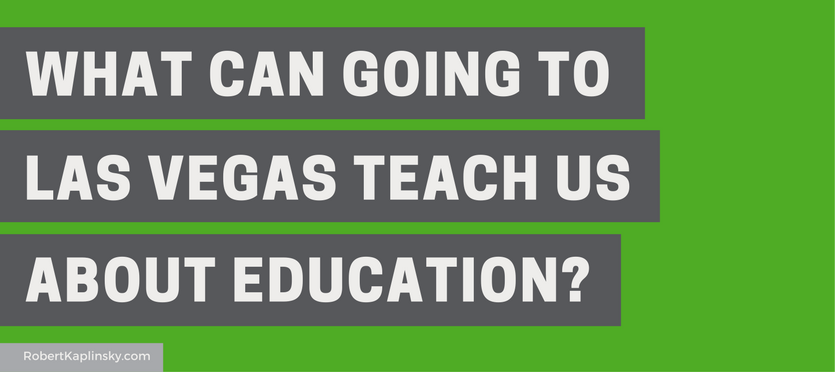Imagine a group of people who all want to go to Las Vegas. They’re all happy and excited… until they get there.
Once they get there, they realize that they wanted to go there for different reasons. One person wanted to gamble. One person wanted to see some shows. One wanted to hang out at the pool. One wanted to eat at the restaurants. One wanted to walk on the strip and look at the lights.
While they all thought they wanted the same thing, in reality they had very different expectations. I call this my Vegas metaphor and I see it happen time and again in education. Colleagues agree on something, but for different reasons, and they don’t realize it because they don’t talk about the details.
Here are some examples I’ve seen:
- “I like this book because it has more pictures and is kid friendly.”
- “This book has videos of real world situations we can use to introduce a topic.”
- “This book has plenty of homework and classwork problems I can give students.”
- “Having the Spanish language version will be really useful for my students.”
I’m not trying to judge any of these reasons’ importance. I’m simply stating that people are evaluating their decisions differently, and that this could cause problems down the line.
- … cover the material at a faster pace so they can include content standards from the beginning of the next course.
- … are given less time to complete a test.
- … use a different book than regular classes.
- … cover some of the Common Core State Standards (CCSS) plus standards (defined in the last paragraph of pg 147)
- … require students to do more homework/classwork/projects/quizzes.
- … do additional higher Depth of Knowledge (DOK) problems and problem-based lessons.
- … cover almost the same content as regular classes but just have the “better” students.
This is an example of the Vegas metaphor because everyone thinks they are in agreement. However, because they aren’t discussing the details, they are unlikely to have equity for students.
- Will the assessment be common amongst the team or individual?
- Will it be formative or summative?
- Will it be created after teaching the unit or before so that educators know what will be assessed?
- What questions will be used?
- They want to gain new strategies and ideas from other teachers.
- They want to see what other teachers are doing wrong so that they can fix a perceived problem.
- They want to see what their future students are learning so they can build upon it.
- They want to see what teachers at high performing schools are doing.
Note that the last bullet is actually a mini-Vegas situation of its own because it isn’t clear if they want to learn from those teachers or just verify that those teachers aren’t doing anything differently than they are.
So, next time you spot a Vegas situation happening, call it out. Mention that there’s a chance that you and others have different understandings/expectations for what should happen, and talk about the finer points. It will take more time, but it could wind up stopping small issues from becoming much bigger later on.

